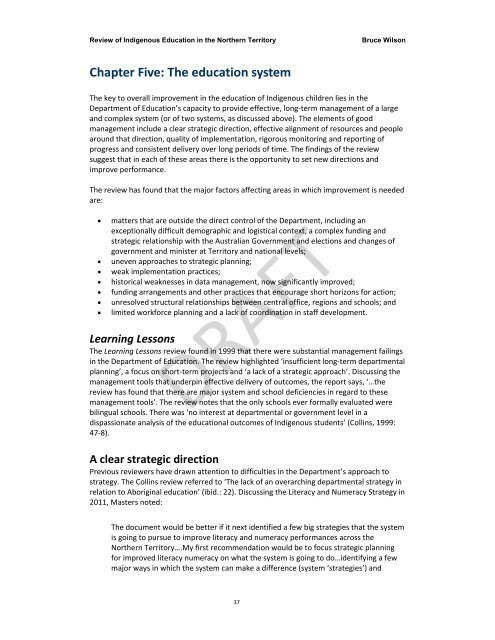Indigenous-Education-Review_DRAFT
Indigenous-Education-Review_DRAFT
Indigenous-Education-Review_DRAFT
You also want an ePaper? Increase the reach of your titles
YUMPU automatically turns print PDFs into web optimized ePapers that Google loves.
<strong>Review</strong> of <strong>Indigenous</strong> <strong>Education</strong> in the Northern Territory<br />
Bruce Wilson<br />
Chapter Five: The education system<br />
The key to overall improvement in the education of <strong>Indigenous</strong> children lies in the<br />
Department of <strong>Education</strong>’s capacity to provide effective, long‐term management of a large<br />
and complex system (or of two systems, as discussed above). The elements of good<br />
management include a clear strategic direction, effective alignment of resources and people<br />
around that direction, quality of implementation, rigorous monitoring and reporting of<br />
progress and consistent delivery over long periods of time. The findings of the review<br />
suggest that in each of these areas there is the opportunity to set new directions and<br />
improve performance.<br />
The review has found that the major factors affecting areas in which improvement is needed<br />
are:<br />
<br />
<br />
<br />
<br />
<br />
<br />
<br />
matters that are outside the direct control of the Department, including an<br />
exceptionally difficult demographic and logistical context, a complex funding and<br />
strategic relationship with the Australian Government and elections and changes of<br />
government and minister at Territory and national levels;<br />
uneven approaches to strategic planning;<br />
weak implementation practices;<br />
historical weaknesses in data management, now significantly improved;<br />
funding arrangements and other practices that encourage short horizons for action;<br />
unresolved structural relationships between central office, regions and schools; and<br />
limited workforce planning and a lack of coordination in staff development.<br />
Learning Lessons<br />
The Learning Lessons review found in 1999 that there were substantial management failings<br />
in the Department of <strong>Education</strong>. The review highlighted ‘insufficient long‐term departmental<br />
planning’, a focus on short‐term projects and ‘a lack of a strategic approach’. Discussing the<br />
management tools that underpin effective delivery of outcomes, the report says, ‘…the<br />
review has found that there are major system and school deficiencies in regard to these<br />
management tools’. The review notes that the only schools ever formally evaluated were<br />
<strong>DRAFT</strong><br />
bilingual schools. There was ‘no interest at departmental or government level in a<br />
dispassionate analysis of the educational outcomes of <strong>Indigenous</strong> students’ (Collins, 1999:<br />
47‐8).<br />
A clear strategic direction<br />
Previous reviewers have drawn attention to difficulties in the Department’s approach to<br />
strategy. The Collins review referred to ‘The lack of an overarching departmental strategy in<br />
relation to Aboriginal education’ (ibid.: 22). Discussing the Literacy and Numeracy Strategy in<br />
2011, Masters noted:<br />
The document would be better if it next identified a few big strategies that the system<br />
is going to pursue to improve literacy and numeracy performances across the<br />
Northern Territory….My first recommendation would be to focus strategic planning<br />
for improved literacy numeracy on what the system is going to do…identifying a few<br />
major ways in which the system can make a difference (system ‘strategies’) and<br />
37


